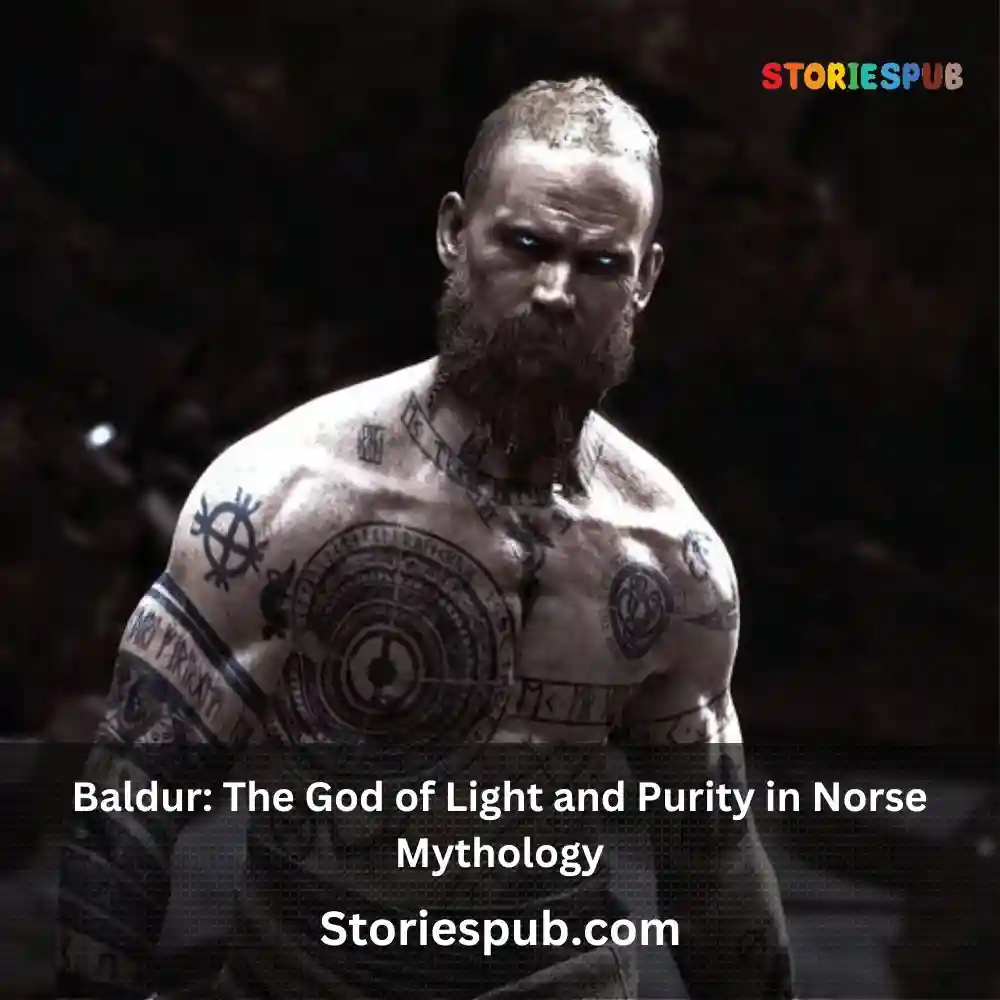Baldur: The God of Light and Purity in Norse Mythology

Introduction
Norse mythology is an intricate and complex network of myths, legends, and stories that formed a significant part of the culture of the ancient Norse people. This mythology was the way in which they explained their beliefs and worldview to one another, and it played a crucial role in shaping their societal norms and traditions.
Gods and goddesses were at the center of this mythology, each with their own unique role to play in the grand scheme of things. Baldur is one such god who played an essential role in Norse mythology.
Known for his association with light, beauty, and purity, he was beloved by many. However, Baldur’s story is not without tragedy; his death sent shockwaves throughout the world of gods and men alike.
The Importance of Gods
In Norse mythology, gods were more than just omnipotent beings; they were integral to understanding the world around them. They represented natural elements like thunderstorms (Thor) or wisdom (Odin).
Culturally, these gods shaped how people saw themselves as well as how they interacted with others. For example, Odin’s emphasis on wisdom meant that storytelling was highly valued among Nordic cultures as a means to share knowledge.
The gods were also seen as protectors; they shielded humans from harm by battling giants or other dangerous creatures like trolls or dragons. In this way, worshiping these deities was seen as a means to ensure safety for oneself and one’s community.
Baldur: The God of Light
Baldur’s name means “shining” or “bright,” which perfectly encapsulates his association with light. He was also known for his beauty – surpassing even that of other gods – which made him highly revered among both divine beings and mortals alike. However, Baldur’s character went beyond just his physical attributes.
He was a kind and gentle god, promoting peace and love throughout the cosmos. It’s said that everything he touched would become blessed with good fortune.
Baldur was considered a symbol of purity; he represented goodness in its purest form. The belief in his benevolence was so strong that the Norse people believed that Baldur could not be hurt or killed by anything on earth, making him an invincible god.
Despite his many positive qualities, Baldur’s story is not without tragedy. His death rocked the world of gods and mortals alike and left a lasting impact on Norse mythology for centuries to come.
Early Life and Family
Baldur’s birth and parentage (Odin and Frigg)
Baldur was born to Odin, the king of gods, and Frigg, his wife. He was one of the twelve major Norse gods and goddesses who played an essential role in the mythology of Viking culture.
Baldur was considered one of the most handsome gods, known for his radiant beauty which made him stand out among his siblings. In Norse mythology, Baldur was associated with light, purity, and goodness.
He was a beloved god who had a gentle personality that drew people to him. His character stood in stark contrast with some of his siblings who were known for their roughness and aggression.
His siblings (including Thor and Loki)
Baldur had many siblings who were also major figures in Norse mythology. His brother Thor was known for his strength as well as his hammer Mjolnir. Loki was another one of Baldur’s brothers – he had a trickster personality that often caused trouble.
Other notable siblings included Vali and Vidar – both powerful gods who played important roles during Ragnarok. Balder also had many half-siblings from Odin’s other relationships including Tyr – god of war, Bragi – god of poetry, Hermod – messenger god among others.
Description of Baldur’s character traits that made him stand out among his family members
Baldur’s gentle nature made him unique amongst the other gods; he showed love to all creatures great or small, even going so far as to heal sick animals when he could. He also had a deep sense of fairness which is evident in how he treated everyone equally regardless of rank or status within the pantheon. He possessed an extraordinary beauty which is said to have emanated from within him; this beauty shone outwards and imbued everything he touched with a sense of lightness, purity, and grace.
Baldur was known to be an excellent speaker as well, possessing great wisdom and eloquence which made him one of the most respected gods amongst his peers. Baldur’s character traits were so impressive that they earned him the title, “the shining one.” His radiance was said to possess a power that could cast out darkness and evil from the hearts of men.
This quality made him beloved by many – not just humans but even other gods. Baldur’s early life and family background played a significant role in shaping his personality.
He grew up surrounded by powerful siblings but possessed a unique combination of beauty, fairness, wisdom, and gentleness that set him apart from others in his family. These traits would define his character throughout his life and make him one of the most beloved gods in Norse mythology.
Prophecy of Baldur’s Death
The prophecy that foretold Baldur’s death was a turning point in Norse mythology. According to the myth, Baldur had been experiencing terrible nightmares about his own death. Frigg, his mother and queen of Asgard, became worried about these dreams and decided to take action.
Frigg traveled to every corner of the world and beyond, asking all living things not to harm her beloved son. As a result of this request, everything in existence made an oath not to harm Baldur except for one small plant – mistletoe.
The measures taken by Frigg to prevent it from happening
Frigg was so determined to protect her son that she went to great lengths to make sure he would remain safe. In addition to asking all living things not to harm him, Frigg also made sure that each one of them swore an oath on it. She believed that this would be enough protection for her son against any type of attack.
To further ensure Baldur’s safety, Frigg went as far as making weapons out of every material known at the time and subjecting them all through various tests on her own son during his sleep. She discovered that nothing could harm him except mistletoe.
Loki’s role in orchestrating Baldur’s death
Sadly for Baldur, Loki found out that there was one thing that could kill him – mistletoe – and set out on a path of destruction by crafting a spear from the plant without telling anyone what he was doing. Loki tricked Hodr into using the spear against Baldur while the other gods were playfully hurling objects at him as part of their immunity celebration ceremony; something they had done before without any incident due to his invincibility.
Without knowing what he had done, Hodr threw the spear at Baldur, killing him instantly. The prophecy of Baldur’s death was a major theme in Norse mythology.
Frigg went to great lengths to protect her son, and the oath taken by everything in existence led to a false sense of security which eventually worked against them. Loki’s actions, fueled by jealousy and resentment, ultimately led to Baldur’s demise.
The Death of Baldur
Detailed account of how Loki tricked Hodr into killing Baldur
Baldur’s death was caused by a treacherous plan orchestrated by the mischievous god Loki. According to Norse mythology, Loki was jealous of Baldur’s popularity and set out to cause chaos among the gods. He discovered that the only thing that could harm Baldur was mistletoe, as Frigg had made sure that everything else in the world had promised not to harm her beloved son.
Loki then crafted a spear made from mistletoe and tricked Hodr, another of Odin’s sons who was blind, into throwing it at Baldur while playing a game with the other gods. The spear pierced through Baldur’s heart, instantly killing him.
The grief felt by the other gods after learning about Baldur’s death
The news of Baldur’s death spread quickly among the other gods and goddesses in Asgard. His death caused great sorrow and mourning among them as he was considered one of their most beloved deities. The beautiful god represented light, goodness, and purity, and his presence brought joy and happiness to all those around him.
The grief felt by his family members was particularly profound; his father Odin wept for him beyond control, while his mother Frigg was inconsolable with pain over her loss. The entire pantheon wept for their loss under an endless night sky.
Odin’s journey to Helheim to retrieve his son
After learning about Baldur’s tragic demise in Helheim—the realm of the dead—Odin embarked on a journey to bring back his son from beyond life itself. Despite being warned against it by many other characters in Norse mythology due to its dangerous nature; Odin rode on Sleipnir—the fastest horse in the world—across the bridge to Helheim, facing many perils and obstacles on the way. Once he reached Helheim, Odin made a deal with Hel, the queen of the underworld.
She agreed to release Baldur only if all living creatures in Asgard wept for him. The gods then sent messengers across all nine worlds telling everyone to mourn for Baldur, which they did.
The only exception was Loki—who had disguised himself as an old woman—but Odin saw through his disguise and refused to weep for Baldur. In this way, Baldur was finally brought back to life by his father’s love and determination.
The aftermath
The death of Baldur marked a turning point in Norse mythology: it showed that even gods were not invincible and could not escape their destinies. It also highlighted betrayal as Loki’s greed had caused a great tragedy that affected everyone involved. As punishment, Loki was chained up inside a cave with venom dripping onto him from above while tied down by his sons’ intestines until Ragnarok (the end of the world).
Additionally, Thor threatened any giants he met not to mention Loki’s name ever again or face severe consequences at his hands. The gods also attempted several times to bring back Baldur but failed ultimately; however, he remained an important symbol of beauty and purity in Norse mythology forevermore.
Aftermath
The death of Baldur had far-reaching consequences for the world of Norse mythology. The gods were devastated by the loss of such a beloved figure, and they sought to bring justice to those responsible for his untimely demise. Loki, who had played a central role in causing Baldur’s death, was punished severely for his actions.
The Punishment of Loki
The gods did not take kindly to Loki’s treachery, and he was eventually captured and brought before them to answer for his crimes. Loki’s punishment was severe; he was bound with the entrails of one of his own sons and left to suffer until Ragnarok, the end of the world. The punishment inflicted on Loki has been seen as a reflection of Norse values regarding justice and retribution.
In Norse mythology, there is a strong emphasis on the importance of maintaining order in society through punishment when necessary. The fact that even a god like Loki could be subjected to such harsh treatment shows just how seriously these values were taken.
Attempts to Bring Back Baldur
Despite their grief at Baldur’s passing, the gods were determined to find a way to bring him back from the dead. Several attempts were made over time to resurrect him but ultimately proved unsuccessful.
One popular story tells how Odin traveled to Helheim, the realm of the dead ruled by the goddess Hel, in an attempt to negotiate Baldur’s release from her domain. He offered Hel great riches and treasures as ransom but was ultimately unsuccessful in persuading her.
Another version tells how Nanna, Baldur’s wife who died from grief soon after her husband’s death, begged Frigg (Baldur’s mother) not be cremated with her husband’s body but changed her mind while inside their sarcophagus when she saw that many other important people were buried alongside their spouses including the goddess Hel in Norse mythology. She left a love letter for her husband before dying and was buried alongside him together with the letter.
The Impact on Norse Mythology
The death of Baldur had a profound impact on Norse mythology as a whole. He was one of the most beloved gods, known for his beauty, purity, and association with light.
The fact that such an important figure could be killed showed that even the gods were not invulnerable to harm. Baldur’s death was also seen as a sign of the coming end of the world.
According to Norse mythology, Ragnarok would eventually bring about the destruction of the universe and all its inhabitants. The death of Baldur was seen as marking the beginning of these events, signaling that all things – even the gods themselves – must eventually come to an end.
Baldur’s tragic story is one that continues to captivate readers today. His life and subsequent death represent some of the most important themes in Norse mythology: values such as justice and retribution, love and loss, and ultimately, acceptance that all things must come to an end.
Legacy
How Baldur’s Legacy Lives On
Baldur may have left the world of the living, but his legacy continues to live on through various aspects of Norse mythology. For starters, he is remembered as one of the most beloved gods whose death had a profound impact on the other gods and goddesses.
His purity and beauty also made him a symbol of perfection and goodness that people looked up to. Moreover, his story has become a source of inspiration for countless artists, writers, and musicians over the years.
From Wagner’s opera “The Ring Cycle” to J.R.R Tolkien’s “Lord of The Rings,” many works of art have drawn inspiration from Baldur’s story. The character Legolas Greenleaf from the Lord Of The Rings movies was based on Baldur himself.
Additionally, in modern times, Baldur has become a popular character in various video games like “God Of War: Ascension,” where players get to play as him in certain levels. In this way, he continues to be an influential figure even in popular culture.
The Significance Of Baldur In Norse Mythology
Baldur’s story is significant in Norse mythology because it represents key themes that were important to their culture. Firstly his association with light represents hope that shone even during dark times like winter when sunlight was limited.
This portrayal makes him important for his spiritual significance as well. Secondly, his death serves as a reminder that even the most loved and respected can fall victim to tragedy- something which would’ve resonated with Norse audiences who lived through hard times during those periods.
It shows that even gods can’t interfere with fate; hence everybody has their destiny predetermined by fate or circumstance. These three themes are prominently displayed throughout Baldurs’ story arch making it an essential part of Norse mythology.
Baldur As A Symbol Of Purity
Baldur’s pure and perfect nature made him a symbol of purity. This portrayal has led to widespread admiration by both the gods and mortal beings alike. He is often portrayed as an innocent, loving god who embodies the traits of goodness and light.
Over time, this image evolved into a representation of purity that transcended religious beliefs. In modern times, we still associate Baldur with purity, decency, and wholesomeness – making it easy for people to relate to his character.
The Story Of Baldur As A Life Lesson
Baldur’s death is a reminder that even the most loved can fall victim to fate or circumstance. It teaches us that we should cherish those we love and appreciate every moment because life is fleeting. Moreover, it also shows how vengeance can lead to destruction- Loki’s jealousy caused him to kill his counterpart; hence he was punished by being tied down until Ragnarok (the end of Norse mythology).
The story shows how important it is not to take things for granted. The other gods took Baldur’s invincibility for granted; hence they never thought he could die which eventually led to his downfall.
Conclusion
The story of Baldur not only represents one of the most profound events in Norse mythology but also teaches us important lessons about life itself. From themes like hope during dark times (winter) to appreciating what you have while you have it; these lessons are just as relevant as they were back then.
Moreover, Baldur continues to inspire people around the world through various works of art like movies or video games which show how impactful his legacy still is even today. So next time you hear about Baldurs’ story, remember that there’s more than just an entertaining myth behind it- there are valuable life lessons that we can all learn from it.
Hey kids, how much did you like The Baldur: The God of Light and Purity in Norse Mythology? Please share your view in the comment box. Also, please share this story with your friends on social media so they can also enjoy it, and for more such Norse Mythology, , please bookmark storiespub.com.
Related Post :
Baldur FAQ
What does Baldur look like?
The appearance of Baldur is not described in detail in Norse mythology, but he is often depicted as a handsome and radiant young man.
What is Baldur's role in Norse mythology?
Baldur is responsible for bringing light and joy to the world, and is often associated with peace and forgiveness.
What are some other stories involving Baldur?
Baldur appears in several Norse myths, including one in which he is killed by the trickery of Loki and another in which he is eventually resurrected and restored to his place as a god.
Is Baldur worshipped in modern times?
Baldur is not worshipped as part of any organized religion in modern times, but he is still studied and appreciated by scholars and enthusiasts of Norse mythology.
What is the significance of Baldur in Norse mythology?
Baldur represents the ideals of purity and innocence in Norse culture, as well as the importance of forgiveness and compassion.
Are there any symbols associated with Baldur?
Baldur is often associated with light and radiance, as well as with the image of the sun, which is said to be his source of power.
Are there any modern adaptations of Baldur in popular culture?
Baldur has been adapted in various forms in popular culture, including in comic books, video games, and television shows. He is often portrayed as a noble and heroic figure with a strong sense of justice and morality.
Are there any modern adaptations of Baldur in popular culture?
Baldur has been adapted in various forms in popular culture, including in comic books, video games, and television shows. He is often portrayed as a noble and heroic figure with a strong sense of justice and morality.
What is Baldur's relationship with the other gods in Norse mythology?
Baldur is sometimes said to be the son of the god Odin and the goddess Frigg, and is considered to be one of the most beloved and respected of all the Norse gods.




